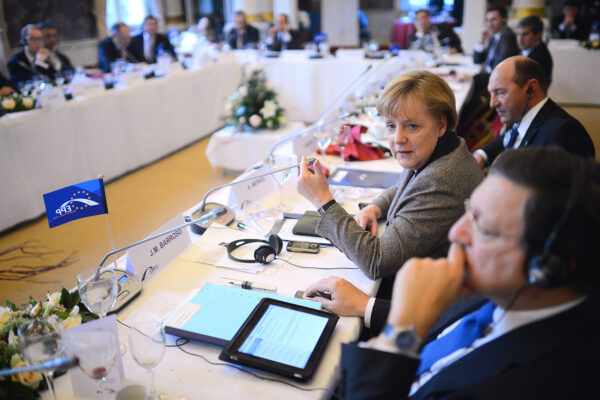
Half the stories for Sunday’s state elections in Germany had probably already been written before the first results started coming in. Chancellor Angela Merkel’s Christian Democrats were supposed to lose across the country as conservative voters expressed their dissatisfaction with her immigration policy by backing the new Alternative für Deutschland party.
Certainly some of that happened. But headlines that say Merkel took a “beating” or populists “surged” overstate the case. There was no political earthquake in Germany this weekend.
From left to far right
Exit polls suggest the anti-immigrant Alternative party did best in the former East German state of Saxony-Anhalt, winning 23 percent of the votes against 29 percent for the Christian Democrats.
That would be a small loss for the right, which won 32 percent in the last election. It is rather the left that has suffered the most. The Social Democrats would go down from 21 to 12 percent; Die Linke from 24 to 17 percent.
This reveals an underreported trend: anti-immigrant sentiment transcends traditional left-right divides. In Saxony-Anhalt, it appears more former socialist party voters switched to the nativist right than did conservatives.
Where the center holds
In Baden-Württemberg and Rhineland-Palatinate, the other two states that held elections on Sunday, the mainstream parties did just fine.
In the latter, the Christian Democrats and Social Democrats, who govern in coalition at the federal level, split 70 percent of the votes in 2011 and did so again this year, according to the exit polls.
In the southwest, voters are clearly satisfied with the Green Party-led government of Winfried Kretschmann. His party goes from 24 to 32 percent support, probably at the expense of their Social Democrats partners. The conservatives do lose a bit in Baden-Württemberg where the Alternative is projected to come in fourth with 12 percent support.
In all three states, though, the incumbents are likely to stay in power and keep the far right out. So much for the widely anticipated backlash.
Pragmatism
None of which is to say the Alternative doesn’t pose a threat to the center-right.
This website has argued that German leaders do risk a backlash if they refuse to take voters’ concerns about mass immigration seriously. But we have also argued that parties in the center tend to be adaptable and that applies especially to Merkel’s.
The chancellor got far ahead of public opinion by letting in a million immigrants last year. She has since backtracked by freezing family reunifications and speeding up deportations. Merkel is still resisting recommendations to cap the number of asylum requests Germany will process, though, a step neighboring Austria has taken and one polls suggest would enjoy broad support.
Sunday’s election result is a disappointment for the Christian Democrats, not a blow. If Merkel’s political career up to this point is any indication, she will interpret it as a call to move further and quicker to reduce the exceptionally high influx of people.
